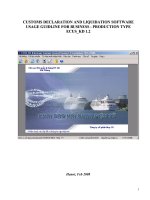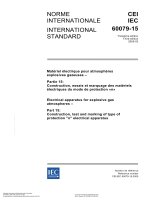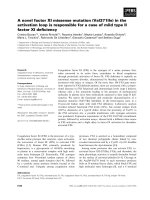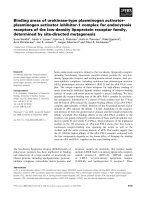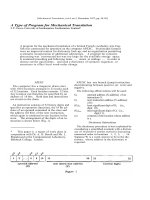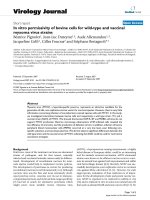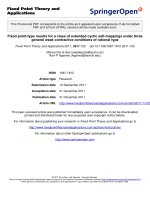Guidline for injection type of gc
Bạn đang xem bản rút gọn của tài liệu. Xem và tải ngay bản đầy đủ của tài liệu tại đây (46.32 KB, 5 trang )
Ambient Liquid Sampling Steps:
1. Load the method for the desired analysis on the ChemStation software.
2. Verify that the injection source in the CS software is correct. Select “Instrument > Select
Injection Source”. It should be set to “GC Injector”.
3. Fill a 1.5-ml vial with the desired sample.
4. Put the vial in the sample vial position in the turret on the auto sampler. Check the solvent wash
vial to ensure that it is full, and the waste vial to ensure that it is empty.
5. At the Chem Station software, select “Runcontrol>Sample Info”. Enter the information for the
current sample. Make sure there is a vial number in the “Location” field; otherwise no injection
will be made.
6. Select “Runcontrol>Run Method” at the Chem Station software. The injection will wash the
syringe, inject sample and wash the syringe again according to the parameters set in method.
The software will automatically start data collection when the injection is made.
Gas sample Injection
1. Load the method for the desired analysis on the ChemStation software.
2. Connect the sample vessel or process line to 1/8” fitting labeled “Gas sample Inlet #1”
3. If necessary, press [Pre-run] at the Agilent Technologies 7890B keypad to set the gas
chromatography from saver mode to run mode.
4. Open the sample vessel or process line to the sample inlet at a purge flow rate of approximately
20-30 ml/min. If the gas flow meter is used, the flow should be under 10ml/min.
Note: For a valid external standard calibration, the sample must be injected at the same
pressure and/or flow rate. This can be accomplished by purging the sample, turning off the
sample pressure, and the allowing the pressure within sample loops to equilibrate to ambient
pressure (use a bubler for the determination) or by running the flow rate at a constant set
point.
5. Press “Start” at the Agilent Technologies 7890B gas chromatograph keypad or allow Chem
Station to start the gas chromatograph remotely.
6. With the sample flow turned off to the GC, disconnect the sample vessel or process line from
GC.
All sample must be filtered against particulates. The correct filter for a gas sample should be a 7
to 15 micron “F” series NUPRO in line filter or equivalent.
Recommended Maintenance
1.
Items
Septa
Symptoms
- Retention time increase
- Peak areas change
- Ghost peaks
Recommended Action
When using syringe
injections, replace every 50 to
100 injections.
Inlet liners
Ferrules
-
Columns
-
Filters
-
Tailing peaks
Nosy baseline
Tailing peaks
Loss of polar peak area
Ghost peaks
Mass discrimination
Poor repeatability
Poor retention time
repeatability
Tailing peak
Excessive gas consumable
Noisy baseline
Broad peaks
Tailing peaks
High bleed (significant
baseline rise)
Shorter retention times
Increase noise and drift
Ghost peaks
Declining column
performance
Replace with every other
septa change or when dirty
Replace when making new
connection or check old
connections for leaks
Replace when performance
no longer meets
requirements.
Replace when performance
cannot be changed with other
column fixes such as heating
column overnight at elevated
temperatures.
Replace every two or four
cylinders of gas or as
indicating traps require.
Valve Runtime Events
Occasionally it may become necessary to adjust or edit the runtime events.
The valve runtime events can be changed with the following keystrokes:
1. Press [Run table]
2. Scroll to the desired valve event using [<] or [>]
3. Enter the desired time in minutes and press [Enter]
To add a valve event to the run tables use the following keystroke:
1.
2.
3.
4.
5.
6.
Press [Run table]
Press [Mode/Type]
Press [Valve]
Press number of the valve for the event
Enter the desired time in minutes when the event should occur and then press [Enter]
Press either [On/Yes] or [Off/No] to choose the valve position for the event.
7693A ALS Prerun Checklist
Use this checklist before running analyses to make sure that
the sample vials and sampler are ready.
Sample vials are at least half full. Sample vials are at least half full.
Sample vials are at least half full. Vial cap is centered, with no wrinkles, and the septum is
flat.
Sample vials are at least half full. Sample vial positions match the run parameters.
Sample vials are at least half full. Each solvent bottle contains 4.5 mL of fresh solvent.
Sample vials are at least half full. Waste bottles are empty.
Sample vials are at least half full. Syringe door is closed.
Sample vials are at least half full. Sufficient solvent and waste capacity is available for
sample vials.
Sample vials are at least half full. Syringe is new or clean.
Sample vials are at least half full. Syringe design and size are correct.
Sample vials are at least half full. Plunger is secure in plunger carrier loop.
Sample vials are at least half full. Needle is aligned with septum retainer nut.
Sample vials are at least half full. Syringe is rinsed with solvent.
Sample vials are at least half full. GC inlet liner is clean and deactivated.
Sample vials are at least half full. GC inlet liner or insert is correct type for injection
technique.
Sample vials are at least half full. GC inlet septum type is correct.
Sample vials are at least half full. GC inlet septum has sufficient life remaining.
Sample vials are at least half full. Correct septum nut is installed in GC inlet
Use the following vials and septa to use highly inflammable solvents such as carbon
disulfide. The
the bottle.
Carbon
septa
and
caps
are
designed
disulfide is a highly flammable solvent with a boiling
not
to
fall
inside
point of46.2 °C, a flash
Point of -30 °C and an ignition point of 90 °C, and is designated as a special inflammable
material in Hazardous Substances Category IV of Japan’s Fire Service Act.
Carbon
disulfide
chromatographs.
is
Care
occasionally
used
is
required
as
a
solvent on
gas
in its use since it has low boiling and ignition points and is highly toxic.
2.5 Selecting the Septum for the Sample Injection Unit
2. White (standard type)
Standard accessory silicon septum
Shimadzu
Standard type (pack of 20)
P/N 201-35584
3. Blue (long-life (LL) septum)
Septum featuring both low bleed and long life
Shimadzu
LL long life (pack of 20)
P/N 221-48972-91
4. Brown (high-temperature (HT) septum)
Bleed amount is less when used at high temperatures compared with LL septa.
Shimadzu
HT for high-temperature use (pack of 20)
P/N 221-48398-91
5. Green (Thermogreen septum)
Least influence of plasticity but hard.
Shimadzu Thermogreen LB-2 (pack of 10) P/N 221-35507-01
ATTENTION
The type of bleeding differs with each septum and appears as a different pattern on
chromatograms.
For high-sensitivity analysis, be sure to select and use a septum that does not allow bleeding to
appear at locations that will obstruct the peak of the target compound. After extraction for several
hours by hexane etc., performing conditioning for several hours at a temperature between about 120 °C
and 150 °C (up to about 200 °C for LL and HT septa) is sometimes effective in decreasing bleeding.
Elastic syringe for AOC-20i
The syringe plunger is made of titanium. Because it is less likely to generate abrasive dust originating
from metal, the syringe is less likely to seize (ít khi bị tắc, nghẹt) , making it ideal for samples that
contain water.
ATTENTION
Microsyringes are made to extremely high precision. So, be sure to use the original syringe body and
plunger set. The syringe alone cannot be used as a replacement part.
